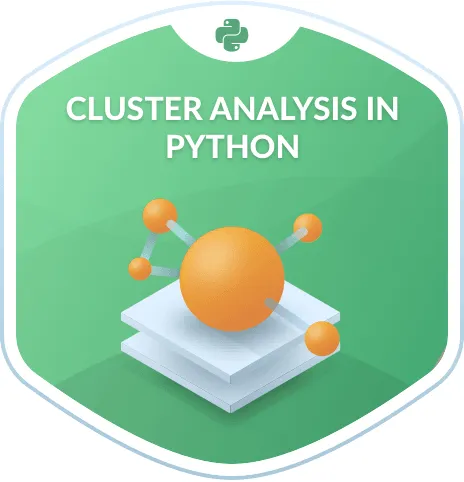
Cluster Analysis in Python 
Discover the secrets behind Google News' automatic grouping of news articles with the Cluster Analysis in Python course. Uncover the process that runs in the background to create these groups through unsupervised learning techniques such as hierarchical and k-means clustering. Using the powerful SciPy library in Python, you will learn how to preprocess data, apply clustering algorithms, and visualize the clusters formed. Dive into player statistics from FIFA 18, a popular football video game, and gain the skills to quickly apply clustering algorithms, analyze results, and unlock valuable insights. Don't miss out on this opportunity to become a clustering expert! Get a comprehesive understanding of Cluster Analysis in Python which is a free trail course. AZ Class provides this course data for free. Learn more certificate and details here. ▼
ADVERTISEMENT
Course Feature
![]() Cost:
Cost:
Free Trial
![]() Provider:
Provider:
ThaiMOOC
![]() Certificate:
Certificate:
Paid Certification
![]() Language:
Language:
English
![]() Start Date:
Start Date:
On-Demand
Course Overview
❗The content presented here is sourced directly from ThaiMOOC platform. For comprehensive course details, including enrollment information, simply click on the 'Go to class' link on our website.
Updated in [October 16th, 2023]
What does this course tell?
(Please note that the following overview content is from the original platform)
In this course you will be introduced to unsupervised learning through techniques such as hierarchical and k-means clustering using the SciPy library
You have probably come across Google News which automatically groups similar news articles under a topic Have you ever wondered what process runs in the background to arrive at these groups? In this course you will be introduced to unsupervised learning through clustering using the SciPy library in Python This course covers pre-processing of data and application of hierarchical and k-means clustering Through the course you will explore player statistics from a popular football video game FIFA 18 After completing the course you will be able to quickly apply various clustering algorithms on data visualize the clusters formed and analyze results
We considered the value of this course from many aspects, and finally summarized it for you from two aspects: skills and knowledge, and the people who benefit from it:
(Please note that our content is optimized through artificial intelligence tools and carefully reviewed by our editorial staff.)
What skills and knowledge will you acquire during this course?
During this course on Cluster Analysis in Python, the learner will acquire the following skills and knowledge:
1. Understanding of unsupervised learning: The course introduces the concept of unsupervised learning, which involves finding patterns and structures in data without the need for labeled examples.
2. Familiarity with clustering techniques: The learner will be introduced to two popular clustering techniques, hierarchical clustering and k-means clustering. These techniques are widely used for grouping similar data points together.
3. Application of clustering using SciPy library: The course focuses on utilizing the SciPy library in Python to implement clustering algorithms. The learner will gain hands-on experience in applying these techniques to real-world datasets.
4. Data pre-processing: The course covers the important step of data pre-processing, which involves cleaning and transforming the data to make it suitable for clustering analysis. The learner will understand the significance of this step in obtaining accurate results.
5. Analysis of player statistics: The course utilizes player statistics from FIFA 18, a popular football video game, as a dataset for clustering analysis. The learner will gain insights into how clustering can be applied to analyze and group similar player profiles.
6. Visualization of clusters: The learner will acquire the ability to visualize the clusters formed by the clustering algorithms. This skill is crucial for interpreting and communicating the results effectively.
7. Analyzing clustering results: After completing the course, the learner will be able to analyze the results obtained from clustering algorithms. This includes evaluating the quality of clusters formed and extracting meaningful insights from the data.
Who will benefit from this course?
This course on Cluster Analysis in Python will benefit individuals who are interested in or working in the field of data analysis, machine learning, or artificial intelligence. Specifically, it will be useful for:
1. Data Analysts: This course will provide data analysts with the necessary skills to apply clustering algorithms on datasets and analyze the results. They will learn how to preprocess data and use techniques such as hierarchical and k-means clustering to identify patterns and group similar data points together.
2. Machine Learning Engineers: Machine learning engineers can benefit from this course as it introduces them to unsupervised learning techniques, specifically clustering. They will learn how to use the SciPy library in Python to implement clustering algorithms and apply them to real-world datasets.
3. Artificial Intelligence Researchers: Researchers in the field of artificial intelligence can gain insights from this course as it covers the process of grouping similar data points together, which is a fundamental task in many AI applications. They can learn how to use clustering algorithms to analyze and understand complex datasets.
4. Data Scientists: Data scientists can enhance their skills by learning clustering techniques through this course. They will be able to preprocess data, apply clustering algorithms, visualize the clusters formed, and analyze the results. This knowledge can be applied to various domains such as customer segmentation, anomaly detection, and pattern recognition.
5. Sports Analysts: The course uses player statistics from a popular football video game FIFA 18 as an example dataset. Therefore, sports analysts who are interested in analyzing player performance and identifying patterns in sports data can benefit from this course. They will learn how to apply clustering algorithms to sports data and gain insights from the results.
Course Provider

Provider ThaiMOOC's Stats at AZClass
Discussion and Reviews
0.0 (Based on 0 reviews)
Explore Similar Online Courses

Beginner Spanish Spanish Level 1 A1 B1

Android Kotlin Developer Online Course

Python for Informatics: Exploring Information

Social Network Analysis

Introduction to Systematic Review and Meta-Analysis

The Analytics Edge

DCO042 - Python For Informatics

Causal Diagrams: Draw Your Assumptions Before Your Conclusions

Whole genome sequencing of bacterial genomes - tools and applications

Hadoop Cluster Administration Course: Guide for Hadoop Admin

Cluster Analysis and Unsupervised Machine Learning in Python


Start your review of Cluster Analysis in Python